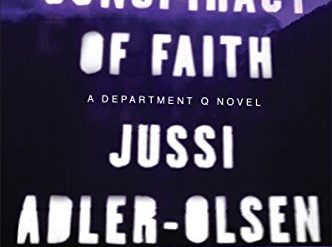
Estimated reading time: 10 minutes
Benjamin Black is the pen name of Irish author John Banville, who is widely regarded as a consummate stylist of the English language. He won the Man Booker Prize in 2005 for his fourteenth novel, The Sea. Banville insists that he writes the Quirke series of Dublin crime novels for the money, but it’s difficult to detect any evidence that he doesn’t give those books the same care he lends to his “serious” fiction.
This post was updated on February 17, 2024.
Christine Falls (2006)—Corruption and mayhem in Dublin and Boston in a superior mystery novel
The woman whose name appears on the cover of this engrossing tale of murder, betrayal, and corruption on high has arrived in Quirke’s morgue, deemed a suicide by the police. When Quirke comes across his brother-in-law, Malachy Griffin, doctoring the records of the young woman’s death, he develops an irresistible urge to examine the case more closely. Naturally, he finds that the reason for the woman’s death was anything but suicide. This is the setup in the first book in the Quirke series of Dublin crime novels . . . Read the full review.
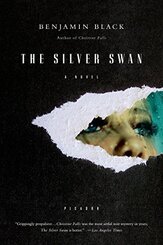
The Silver Swan (2007)—A suspenseful novel that will keep you guessing until the end
Like many of the best crime writers, Black focuses on character, atmosphere, and language as much as on plot. The sure hand of a master stylist is very much in evidence in The Silver Swan. You’ll see it in the dialogue, where the individual speech patterns of his characters are distinctive, and in his lyrical descriptions of Dublin in the rain. If you read this book to the end, you might think you’ve gotten to know Quirke, and you may like him. You might also have a sense of Dublin, even if you’ve never been there . . . Read the full review.

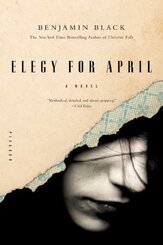
Elegy for April (2010)—1950s Dublin: murder and the Church
Elegy for April is the third of Black’s seven Dublin crime novels novels about the alcoholic pathologist in 1950s Dublin whom we know only as Quirke. These novels explore the tight grip of the Catholic Church on Irish society and the crimes so often committed in her name. Quirke, though he has no official role as an investigator, is drawn into what usually prove to be murder cases by virtue of his family’s involvement . . . Read the full review.
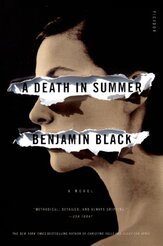
A Death in Summer (2011)—Murder in Dublin, and an unconventional sleuth who solves the case
The “death in summer” that gives this tale its title is the shotgun beheading of a ruthless Dublin businessman who leaves behind a French widow, a sister, and enough enemies to populate an Agatha Christie whodunit. However, despite a plethora of suspects, Quirke and Hackett, his collaborator in the Garda (the Dublin police), focus on those closest to the deceased. As the investigation unfolds, Quirke dives deeply into the complex relations within the victim’s family and becomes romantically involved with the widow . . . Read the full review.
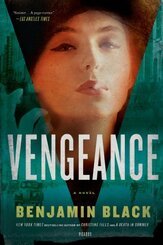
Vengeance (2012)—Benjamin Black’s Quirke series: Is it “serious literature?”
In the Quirke series of Dublin crime novels, Banville comes to grip with the Irish elite, the underlying tension between Catholic and Protestant, the dead weight of the Church, and the veil of history. Quirke and his police collaborator, Inspector Hackett of the Garda, invariably find themselves caught up in the often violent conflicts roiling Dublin’s elite society. In Vengeance, two families are locked in combat for three generations, one Protestant, one Catholic, as partners in one of the country’s biggest businesses. The mysterious death at sea of one of the partners triggers an investigation by Quirke and Hackett that leads them to uncover long-hidden family secrets . . . Read the full review.
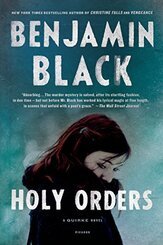
Holy Orders (2013)—From Benjamin Black, a mystery to savor for its gorgeous prose
The sixth of Banville’s novels (writing as Black) about the tortured Dublin pathologist who appears to be named only Quirke is a textbook example of dazzling prose. Any reader looking for nonstop action and sheer excitement won’t find them in Holy Orders. Black is concerned more with character development and scene-setting than with the usual conventions of the mystery genre. The story involves Quirke, his daughter Phebe, and his pal Inspector Hackett of the Garda in a complex plot with Irish “travelers” (called “tinkers” in Ireland) and a passel of very unpleasant priests and their enforcers . . . Read the full review.
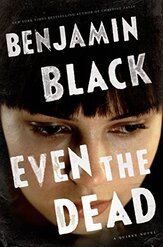
Even the Dead (2015)—Dublin’s answer to Sherlock Holmes and Dr. Watson?
Quirke and Detective Inspector Hackett bear not the slightest resemblance to Sherlock Holmes and Dr. Watson. But they have come together once again because a young man thought to have been a suicide has instead, apparently, been murdered. In the 1950s, Ireland is the same poor country it had been for centuries, long before the recent boom that first lifted its economy into the heights of prosperity and then sent it crashing below. In “this mean and mendacious little city,” as Quirke thinks of it, alcohol almost invariably fuels social interactions, and alcoholism is rampant. He, the Catholic Church reigns supreme and untouchable—and yet when Quirke and Hackett deduce that the Church is somewhere in the background of this latest murder, they don’t hesitate to take it on, all-powerful or not . . . Read the full review.
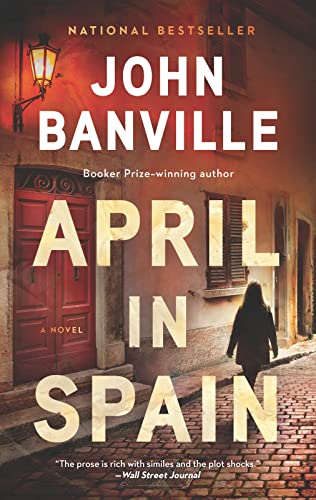
April in Spain (2022)—Quirke is back in a new historical murder mystery
April in Spain is full of surprises for Benjamin Black fans. The novel opens in London with an introduction to a sociopathic gay hitman who clearly has a central role to play in the story that follows. (We revisit his life from time to time in chapters inserted among those centering on the other major characters.) The second surprise—assuming we overlook the fact that Quirke is now in Spain—is that the good doctor is married for a second time. Evelyn Blake is an Austrian Jew, a psychiatrist from Vienna, of all places. “So far, they couldn’t get enough of each other.” And she is managing to tolerate Quirke’s grumpiness in the understanding that he’ll keep his drinking under control.
Then comes the biggest surprise of all. As he and Evelyn are strolling on the beach, he catches a glimpse of a young woman he’s certain he’d known in Dublin. And therein lies the tale, since she had been dead and buried four years ago, murdered by her brother. Read the full review.
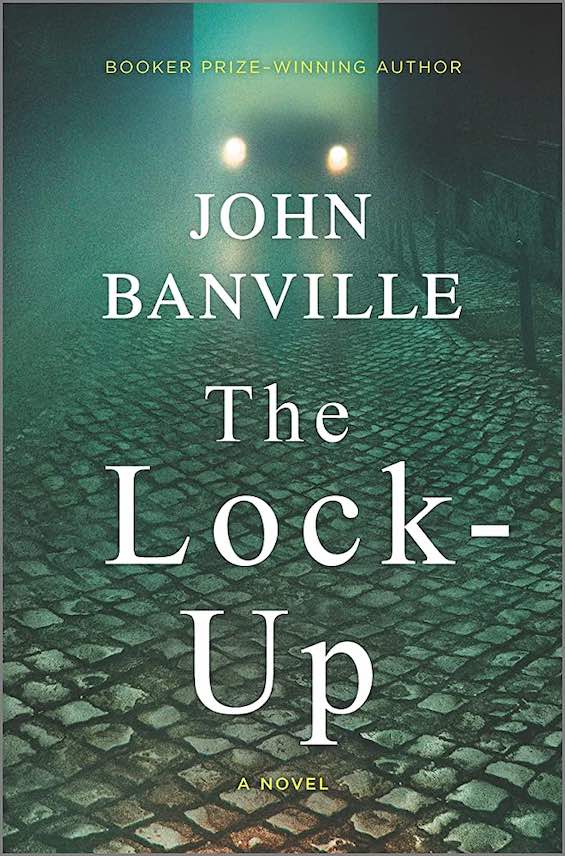
The Lock-Up (Quirke #9) by John Banville—Quirke is on a collision course with the Church—again
Quirke’s beloved wife, Evelyn, is dead. Shot in Spain by an assassin targeting someone else, and before Quirke’s eyes. Now, six months later as the new Quirke mystery opens, the pathologist is back in Dublin. Not on a nonstop bender, as everyone expects, but drinking heavily nonetheless—and at his irascible worst, picking fights with everyone in sight. He’s living with his daughter, Phoebe, who somehow manages to tolerate him. And now Detective Inspector St. John Strafford of the Garda brings him in to examine the body of a young woman dead of an apparent suicide. Slumped over the wheel of a car in a closed garage with the windows closed and a hose from the exhaust threaded past a window. But it’s not suicide, and Quirke knows it. So begins the ninth novel in John Banville’s extraordinary historical mystery series, The Lock-Up.
The man behind these books
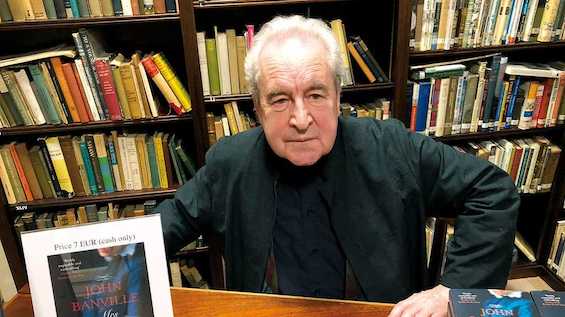
Writing in the New York Times (October 2, 2020), Charles McGrath reported that John Banville has “killed off” his pseudonym Benjamin Black. The article reveals a great deal about Banville’s personality and his approach to writing. The author had given the impression that he wrote the Quirke stories simply to make money and regarded them as inferior to his more “serious” work which won him the Man Booker Prize in 2005. The Quirke novels “haven’t made him rich, or as rich as Banville hoped,” McGrath reports. But the man seems to have revised his opinion of their worth. “In rereading some of the Black books, he decided they were better than he remembered. ‘I was surprised and highly gratified to discover they weren’t bad at all, and in fact might even be quite good.'”
For related reading
You may wish to check out the first in what appears to be a new series of Dublin crime novels written by John Banville under his own name: Snow (John Banville launches a new detective series).
I have also reviewed Doctor Copernicus (Revolutions Trilogy #1) by John Banville (He revolutionized our view of the universe) and four other John Banville books published under his pseudonym, Benjamin Black:
- The Black-Eyed Blonde, resurrecting Raymond Chandler’s iconic sleuth, Philip Marlowe (Benjamin Black brings back Philip Marlowe)
- The Lemur, set in contemporary New York City and Dublin (A murder mystery from a master stylist)
- Wolf on a String (A murder mystery set in the Holy Roman Empire)
- The Secret Guests (Booker Award winner Benjamin Black returns to historical fiction)
You might also enjoy my posts:
- Top 10 historical mysteries and thrillers
- Top 10 mystery and thriller series
- 20 excellent standalone mysteries and thrillers
- 5 top novels about private detectives
- Two dozen outstanding detective series from around the world
- Top 20 suspenseful detective novels
And you can always find my most popular reviews, and the most recent ones, on the Home Page.




